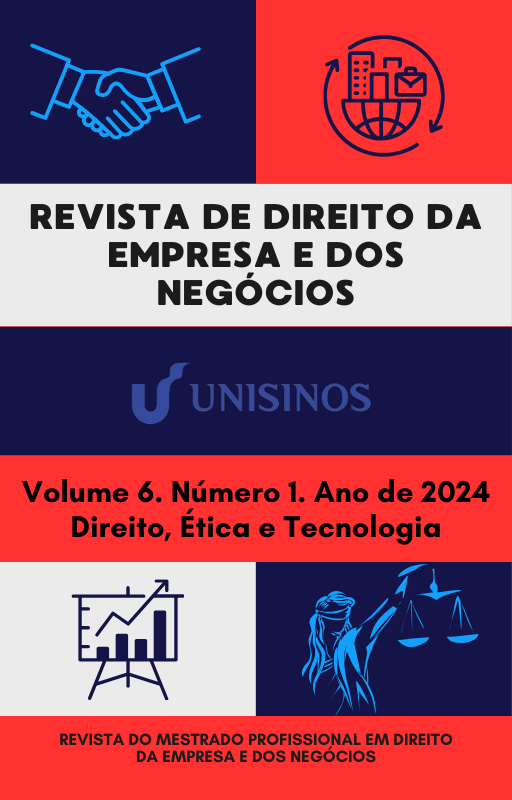O ENCONTRO DA INTELIGÊNCIA ARTIFICIAL COM A RESPONSABILIDADE CIVIL
Abstract
This article aims to study the institute of Artificial Intelligence, knowing its foundations and origin, studying the various other concepts and institutes that involve it. It is understood that it is necessary to identify the risks arising from the use of AI and how Law can deal with this new reality, with a special focus on the field of Civil Liability and the challenges brought by Artificial Intelligence linked to the need for regulation and ethical action. The methodology used in the research was theoretical and descriptive.
References
BRASIL. 2021. Projeto de Lei 20/2021. Estabelece princípios, direitos e deveres para o uso de inteligência artificial no Brasil, e dá providências. Autor da Proposta Eduardo Bismarck (PDT-CE). Disponível em https://www.camara.leg.br/proposicoesWeb/prop_mostrarintegra?codteor=1853928&filename=PL%2021/2020. Acesso em: 22 jun 2024
BRASIL. 2023. Projeto de Lei 2338/2023a. Dispõe sobre o uso da Inteligência Artificial. Autor da proposta Rodrigo Pacheco (PDS-MG). Disponível em https://legis.senado.leg.br/sdleg-getter/documento?dm=9347622&ts=1718902555936&disposition=inline. Acesso em: 22 jun. 2024.
BRASIL. Supremo Tribunal Federal. STF finaliza testes de nova ferramenta de Inteligência Artificial. 11 maio 2023b. Disponível em https://portal.stf.jus.br/noticias/verNoticiaDetalhe.asp?idConteudo=507120&ori=1 Acesso em: 22 jun. 2024.
CANDIOTTO, K.B.B.; KARASINSKI, M. 2022. Inteligência artificial e os riscos existenciais reais: uma análise das limitações humanas de controle. Filosofia UNISINOS, 23(3)1:12. Disponível em: https://search.ebscohost.com/login.aspx?direct=true&AuthType=ip,shib&db=asn&AN=160788834&lang=pt-br&site=ehost-live. Acesso em: 21 abr. 2024.
COLOMBO, C.; FACCHINI NETO, E. 2017. Mineração de dados e análise preditiva: reflexões sobre possíveis violações ao direito de privacidade na sociedade da informação e critérios para sua adequada implementação à luz do ordenamento brasileiro. Revista de Direito, Governança e Novas Tecnologias (CONPEDI), 3(2): 59-80. Disponível em: http://indexlaw.org/index.php/revistadgnt/article/view/2345. Acesso em: 24 abr. 2024.
COLOMBO, Cristiano Inteligência artificial aplicada ao setor empresarial na oferta de bens e serviços [livro eletrônico] : princípios, riscos e recomendações práticas / Cristiano Colombo, Guilherme Damasio Goulart, Wilson Engelmann. -- Porto Alegre, RS : Gráfica RJR, 2023.
CONSELHO NACIONAL DE JUSTIÇA. 2019. Inteligência artificial no poder judiciário brasileiro. Brasília: CNJ. Disponível https://www.cnj.jus.br/wp-content/uploads/2020/05/Inteligencia_artificial_no_poder_judiciario_brasileiro_2019-11-22.pdf. Acesso em: 22 jun. 2024
GRECO, R,; ALVES, D.L.; DE MATTEU, I.F. 2023. Inteligência artificial, quais os limites? Revista de Direito Constitu cional e Internacional, 31(136):153-164.
LORDELO, J.P. 2021. Algoritmos e direitos fundamentais: riscos, transparência e accountability no uso de técnicas de automação decisória. Revista Brasileira de Ciências Criminais, (29):186:205-236.
MELO, B.L.A.; ANDRADE, D.C.M. 2022. Inteligência artificial e União Europeia: uma breve análise quanto à proposta de regulação apresentada pelo Conselho Europeu. Revista dos Tribunais, 111(1041):203-219.
NASCIMENTO, H.C.P.; SOUZA, M. B.; OLIVEIRA, P. S. 2021. A regulação da inteligência artificial e novos contornos para caracterização da responsabilidade civil. Revista de Direito, Governança e Novas Tecnologias, 7(2):73–90. Disponível em: https://search.ebscohost.com/login.aspx?direct=true&AuthType=ip,shib&db=asn&AN=155349703&lang=pt-br&site=ehost-live. Acesso em: 21 abr. 2024.
OPICE BLUM. 2023. Marco legal da inteligência artificial no Brasil (PL 2338/2023). Disponível em https://opiceblum.com.br/marco-legal-da-inteligencia-artificial-no-brasil-pl-2338-2023/. Acesso em: 22 jun. 2024.
PAIVA, D.P.; FREITAS, H.P. 2023. Estudos iniciais da inteligência artificial: ferramenta acessória ou um novo sujeito processual? Revista Meritum, 18(4): 256–267. Disponível em: https://search.ebscohost.com/login.aspx?direct=true&AuthType=ip,shib&db=asn&AN=174362680&lang=pt-br&site=ehost-live. Acesso em: 21 abr. 2024.
PEREIRA, Ana Paula. O que é um algoritmo? Disponível em: https://www.tecmundo.com.br/programacao/2082-o-que-e-algoritmo-.htm. Acesso em: 24 ago. 2024.
PINHEIRO, A. 2019. Redes neurais artificiais. Fluke Operadora. Disponível em https://medium.com/@augusto_Pinheiro/redes-neurais-artificiais-133de77c7240 Acesso em: 26 maio 2024.
SÃO PAULO. 2024. Tribunal de Justiça. Apelação Cível 1039281-34.2023.8.26.0100; Relator (a): Jacob Valente. Órgão Julgador: 12ª Câmara de Direito Privado. Data do Julgamento: 16 abr. 2024.
SÃO PAULO. 2023. Tribunal de Justiça. Embargos de Declaração Cível 1004326-87.2022.8.26.0010. Relator (a): Mendes Pereira. Órgão Julgador: 15ª Câmara de Direito Data do Julgamento: 29/05/2023; Data de Registro: 29/05/2023)
SWARTZENBERG, Felicia. 2023. Philosophy, ethics, and the pursuit of 'responsible' artificial intelligence. Rochester Institute of Technology, (RIT). Disponível https://www.rit.edu/news/philosophy-ethics-and-pursuit-responsible-artificial-intelligence. Acesso em: 23 maio 2024.
Downloads
Published
Issue
Section
License
Concedo à Revista de Direito da Empresa e dos Negócios o direito de primeira publicação da versão revisada do meu artigo, licenciado sob a Licença Creative Commons Attribution (que permite o compartilhamento do trabalho com reconhecimento da autoria e publicação inicial nesta revista).
Afirmo ainda que meu artigo não está sendo submetido a outra publicação e se foi publicado na íntegra em outro periódico e assumo total responsabilidade por sua originalidade, podendo incidir sobre mim eventuais encargos decorrentes de reivindicação, por parte de terceiros, em relação à autoria do mesmo.
Também aceito submeter o trabalho às normas de publicação da Revista de Direito da Empresa e dos Negócios acima explicitadas.

